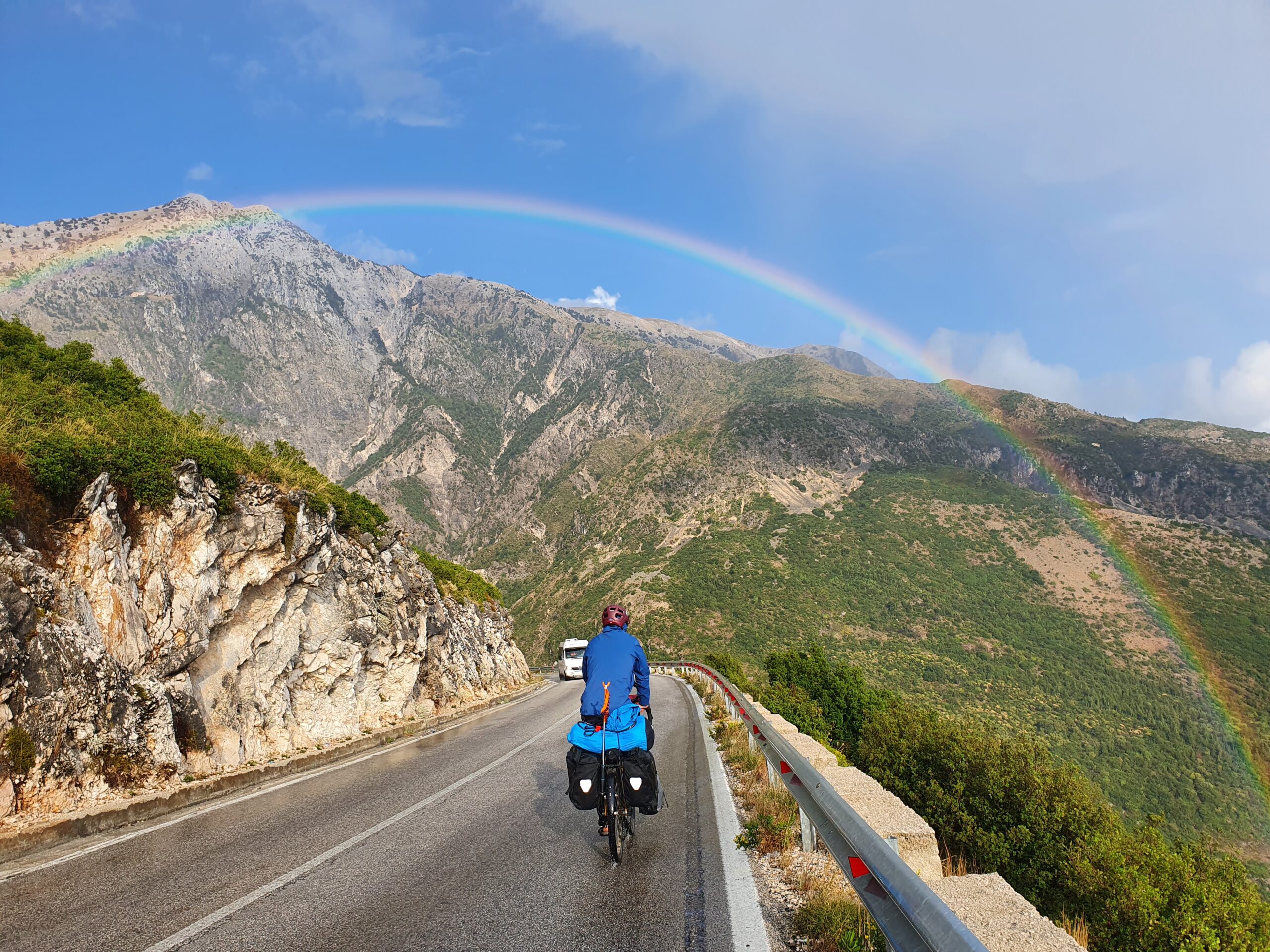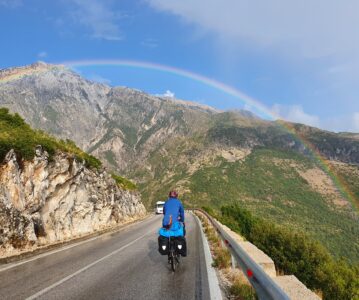After three nights we both feel strong enough again to continue our journey. In the meantime, we have adjusted our originally planned route through the middle of the Albanian mountains in favor of spending more time along the coast. The drive out of Divjake Park takes us on sandy beach paths through a lowland. A fisherman who, along with his buddy, regularly casts his fishing line into one of the smaller lagoons chats with us about life in Switzerland. “Way too stressful for me,” is his conclusion after a brief stay in Basel. “Sitting here and fishing, this is a very peaceful day. You breathe this air and all your problems will go,” he says, letting the freshly mounted lure plop into the water and gazing contentedly across the water.
Contrary to all prejudices, driving on Albanian roads is relaxed and good. The drivers overtake with a lot of distance, greet us regularly with a friendly honk, a thumbs up or at least a smile. The coastal road winds sometimes closer and sometimes further away from the sea over hills, through olive groves and small villages. Probably due to the lack of a functioning collection system, we repeatedly encounter small garbage dumps or smoldering trash fires. However, the houses and gardens are very well kept. Each house has some fruit trees like fig, pomegranate and walnut, some chickens, barking dogs and sometimes a cow or some goats. The cities surprise us with a pleasant bustle, inviting parks, beautiful mosques and countless coffee shops where we treat ourselves to a macchiato at least once a day.
We drive and drive and at some point it is high time to find a place. At the roadside we spy the perfect place: an unfinished, two-story building, which is easily accessible from the road. We beckon the farmer’s wives from next door and thanks to google translate we soon settle in comfortably. The covered balcony on the second floor accommodates our tent and on the flat roof we cook under the starry sky. The water and fresh vegetables are brought to us by the two women after we have inquired about the next store. The donated tomatoes and cucumbers taste delicious and will enrich our lunch picnics for another three days.
We feel safe and comfortable and the watchful dogs from the neighborhood let us sleep surprisingly peacefully.
We set out the next day in beautiful sunshine and watch as darker and darker clouds gather over Llogarase Park. Before the road mercilessly spirals upwards, we stock up our food supplies and discuss what we want to do. Sit out the storm and wait for better times? Or just drive off and hope we don’t get struck by lightning? Of course we decide for the second option and so we pedal our way up the pass during the next hours in all possible intensity levels of the rain. For the first time in a long time, we put our tippets through their paces. I decide because of the still very warm temperatures soon for the permanent shower and change only before the departure in dry clothes. Shortly before the top of the pass, the rain fortunately subsides and the impressive descent is crowned, in addition to another heavy rain shower, by a wonderful rainbow, fantastic views of the glittering sea and the steeply sloping mountain flanks. Suddenly the villages stick as white stone houses photogenically in the slopes and remind strongly of Greece.
Orthodox chapels and churches can also be seen and signs point to ancient ruins. Finding a suitable place to spend the night is a bit more difficult today. On this side of the mountain people seem to finish their buildings more often. Eventually, however, we find what we are looking for. Our domicile today has some advantages: protection from wind and weather, fantastic, unobstructed view to the sea, privacy from possible neighbors and of course a lot of dry space for all our luggage, including a clothesline for our wet things. Again we hit the bull’s eye in the bingo of building ruins. After dark we hear strange noises from the open first floor. We shine a light from our platform on the second floor down on the house swing and observe to our astonishment that some semi-wild horses are also settling in here for the night.
In the early morning hours a deafening “Eeyore” wakes us from our sleep. The supposed horse is probably a donkey or mule and its call is immediately answered by another animal some distance away.
After another day with many meters of altitude and bombastic views, the next day surprises us with a very special place:
We are travelling through Albania. The route has taken us from Shkoder to the coast, through a few national parks and now to a beach on the southern coast of Albania. Bunec is an isolated beach 60 kms from the Greek border. The entrance road is guarded by handful of desolate buildings, broken down machinery and a pack of wild dogs. Though if you can brave these things you can enjoy even more desolated buildings, a few camper vans, scattered garbage and a cute little stone beach.
It is off season in the Balkan so many places are closed down or in slow mode. Along the beach 10 meters back from the water we find a cafe. The cafe is closed and the owners have fenced off the covered sitting area. Though, for people with the eye for it and a bit of cheek, the fence creates a kind of terrace with enough room to put up a tent. We set up and are pretty pleased with the spot. Looking out to the sea from our new home we have the camper vans and other cafes to our left and a rocky coast line to our right.
It’s not long till the first long haired groups come staggering over the rocks. Baggy earth tones loosely cover their bodies, none quite the same as the other. They smile and many stop to great us to this wonderful place. They are staying a 20 minutes walk up the coast line and we are invited to come meet the family.
We stay one more day and one more. Rarely have we felt so relaxed and enjoyed the drifting so much. We cook on the fire, swim in the crystal clear sea, chat with the rainbow people and other travelers, wash our clothes, enjoy the starry sky and do some internet tasks in the simple beach café.


